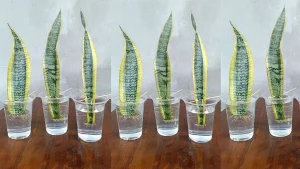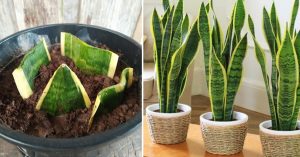Sansevieria is a resilient plant, and with the right care, the propagated sections should develop into healthy new Sansevieria plants. Remember to continue caring for them as you would for mature Sansevieria plants, ensuring they have the appropriate light, water, and temperature conditions.
Propagating Sansevieria, commonly known as the snake plant or mother-in-law’s tongue, is a straightforward process. Here are the steps to multiply Sansevieria:
Materials Needed:
- Healthy Sansevieria plant
- A well-sharpened, disinfected knife or scissors
- Rooting hormone (optional but recommended)
- Potting soil
- A small pot
Steps:
- Select a Healthy Leaf: Choose a healthy Sansevieria leaf that you want to propagate. Look for a leaf that is free from any damage or disease.
- Cut the Leaf: Use a well-sharpened knife or scissors to cut the leaf into sections. Each section should be about 2-3 centimeters in length. You can cut the leaf into as many sections as you want to create new plants.
- Optional: Use Rooting Hormone: While it’s not necessary, using a rooting hormone can help speed up the root development process. Follow the instructions on the rooting hormone package.
- Plant the Sections: Insert the cut end of each leaf section into the potting soil, burying it about 1 centimeter deep. Make sure the sections are planted vertically with the cut end down.
- Provide Adequate Care: Place the pot in a well-lit location but away from direct sunlight, as Sansevieria prefers bright, indirect light. Keep the soil consistently moist but not waterlogged. Avoid overwatering, as Sansevieria is susceptible to root rot.
- Wait for Root Development: It will take approximately a month or more for the Sansevieria leaf sections to develop roots. Be patient during this period.
- Transplanting: After the new plants have formed roots and are growing well, wait at least two months before transplanting them into their final pots. This allows the young plants to establish themselves.











